Creative Biolabs has a tradition of commitment. To achieve efficient execution and regulatory approval, we offer careful considerations of your program for the development of a cellular or gene therapy product – now and in the future.
EXPLORE MORE HighlightsWe focus on unmet needs and develop novel cellular and gene drugs and solutions that offer significant benefits over existing options.
EXPLORE MORE HighlightsThe advent of Chimeric Antigen Receptor T-cell (CAR-T) therapies has revolutionized the field of oncology, providing new avenues for treating various forms of cancer. Our 20 years of experience in the biotechnology sector have equipped us with the expertise and technological capabilities to support the entire lifecycle of CAR-T products, from early development to commercialization.
EXPLORE MORETo accelerate advanced breakthroughs of your projects, we offer broad range of platforms which enable our clients be free to tackle problems with cutting-edge technologies from different angles and in different methods.
EXPLORE MORE HighlightsUse the resources in our library to help you understand your options and make critical decisions for your study. We offer oncolytic virus, CAR-T, and dendritic cell related documents, as well as newsletter. If you don't find the answers you're looking for, contact us for additional assistance.
EXPLORE MORE HighlightsGet a real taste and understanding of the business and culture of one of the world's great research-based cellular and gene therapy discovery and development companies.
EXPLORE MOREAll products and services are For Research Use Only and CANNOT be used in the treatment or diagnosis of disease.
Creative Biolabs has successfully developed a comprehensive range of EpCAM-related products to aid in global customers’ CAR-T development.
Epithelial cell adhesion molecule (EpCAM) or CD326, is a kind of extensive epithelial differentiation antigen expressed in different degrees in the basolateral surface of all tumors. As a kind of homotypic cell adhesion molecule, which is closely related to the Cadherin-Catenin and WNT pathways, and participated in the cell adhesion process through Ca2+ independent homophilic cell-cell adhesion. EpCAM is involved in the cancer cell invasion and metastasis process, and is associated with poor prognosis in many cancer types. Anti-EpCAM CART development serves as a promising therapy approach for the treatment of many cancers, including colon cancer, breast cancer, etc.
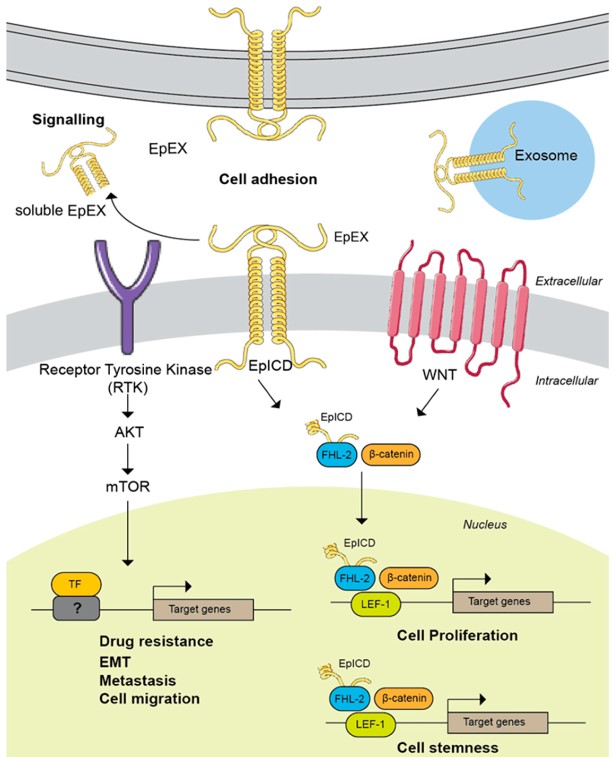 Fig.1 Schematic diagram of EpCAM localization and regulation in the cancer pathway.1
Fig.1 Schematic diagram of EpCAM localization and regulation in the cancer pathway.1
Anti-EpCAM CAR-T Expression Test
At Creative Biolabs, we supply a wide range of CAR testing reagents, including different labeled antigen-specific reagents, and different linker-specific antibodies. Meanwhile, we offer various approaches to support CART testing services, such as flow cytometry, qPCR, and WB methods.
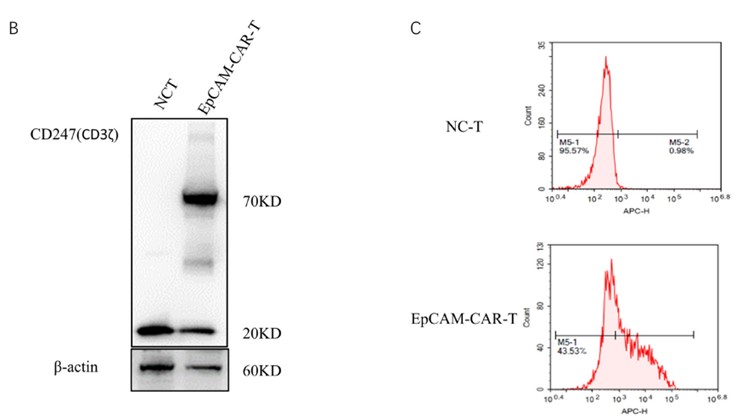 Fig.2 Analysis of CD3ζ and EpCAM CAR expression on anti-EpCAM CART cells. B) CD3ζ expression measured by WB. C) EpCAM-CAR expression detected by flow cytometry.2
Fig.2 Analysis of CD3ζ and EpCAM CAR expression on anti-EpCAM CART cells. B) CD3ζ expression measured by WB. C) EpCAM-CAR expression detected by flow cytometry.2
Anti-EpCAM CAR-T Cytokine Release Test
The cytokine-releasing capability of CART cells serves as an index for function characterization, providing some potential information for CART development. Creative Biolabs is committed to offering comprehensive cytokine testing services using methods that are more tailored to customer needs, including ELISA, ELISPOT, and multiple cytokine array.
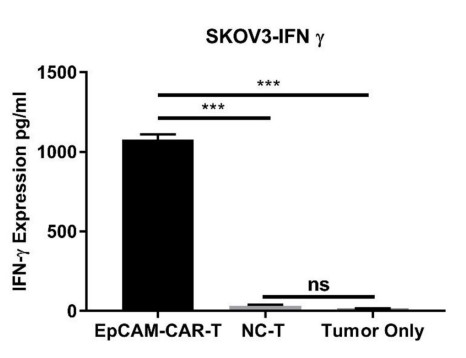 Fig.3 Cytokine IFN-γ releasing analysis in anti-EpCAM CART cells co-cultured with SKOV-3 ovarian cancer cell line for 24hrs.2
Fig.3 Cytokine IFN-γ releasing analysis in anti-EpCAM CART cells co-cultured with SKOV-3 ovarian cancer cell line for 24hrs.2
Anti-EpCAM CAR-T In Vitro Cytotoxicity Assay
For in vitro anti-tumor testing, we provide various robust approaches to aid in customers' projects, including luminescence detection, fluorescence detection, and real-time cell analysis assay.
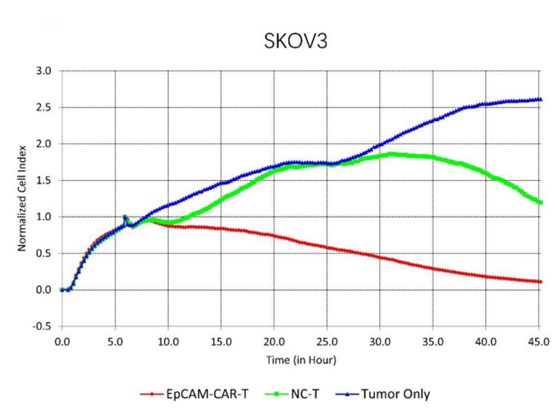 Fig.4 In vitro cytotoxicity evaluation of anti-EpCAM CART cells against SKOV3 target cells detected by RTCA assay.2
Fig.4 In vitro cytotoxicity evaluation of anti-EpCAM CART cells against SKOV3 target cells detected by RTCA assay.2
Efficacy Test of Anti-EpCAM CAR-T
Regarding the invivo efficacy test, we offer a comprehensive range of animal models, as well as optimized experimental design solutions for CART development to suit various needs of global customers.
 Fig.5 In vivo effects analysis of tumor growth and survival in intraparenchymal CAR T-cell injection model. k). Tumor growth detection of pooled tumor areas following local injection of GFP labeled anti-EpCAM CAR T-cells (green lane) or GFP labeled control T-cells (gray lane) on indicated timeline determined by in vivo microscopy using epifluorescence. I). Mice survival analysis with brain tumors following treatment with GFP labeled anti-EpCAM CAR T-cells (green lane) or GFP labeled control T-cells (gray lane).3
Fig.5 In vivo effects analysis of tumor growth and survival in intraparenchymal CAR T-cell injection model. k). Tumor growth detection of pooled tumor areas following local injection of GFP labeled anti-EpCAM CAR T-cells (green lane) or GFP labeled control T-cells (gray lane) on indicated timeline determined by in vivo microscopy using epifluorescence. I). Mice survival analysis with brain tumors following treatment with GFP labeled anti-EpCAM CAR T-cells (green lane) or GFP labeled control T-cells (gray lane).3
In Vivo CART Cells Characterization Analysis
In order to detect the relevant performance of CART cells in in vivo animal models, we have also developed a number of dynamic analysis services to accurately characterize the function of CART cells.
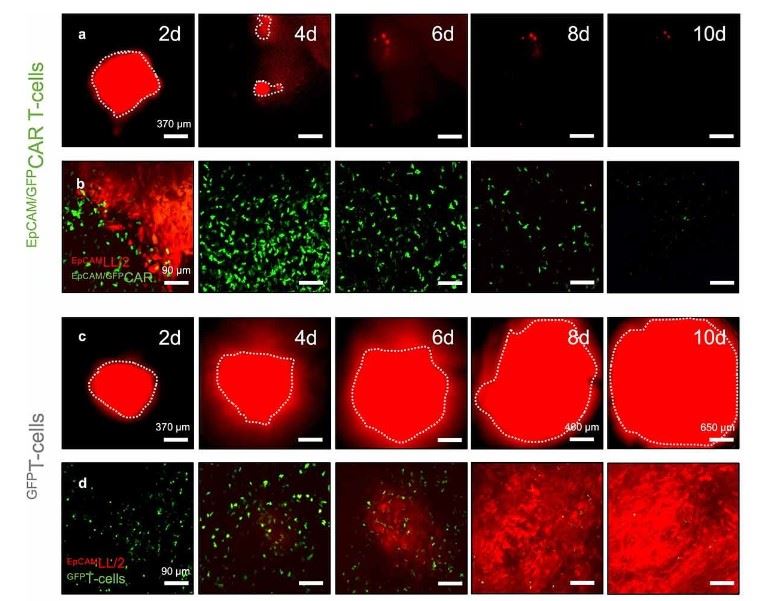 Fig.6 In vivo dynamic analysis of anti-EpCAM CAR-T distribution after intraparenchymal injection using epifluorescence (a&c) and two-photon laser scanning microscopy (b&d).3
Fig.6 In vivo dynamic analysis of anti-EpCAM CAR-T distribution after intraparenchymal injection using epifluorescence (a&c) and two-photon laser scanning microscopy (b&d).3
Toxicity Evaluation Anti-EpCAM CAR-T
Therapeutic efficacy assessment and toxicity evaluation results are very important experimental data to evaluate whether the CART project can be continued in the CART development. Creative Biolabs is committed to providing robust and reliable toxicity evaluation services to accelerate CART projects, such as off-target toxicity analysis, and tumorigenicity study.
References
 Loading...
Loading...
| CAT | Product Name | Target Species | Antibody Clone | Antibody Host | Receptor Construction | Vector Type | Targeting Cell Type | CAR Vector Type | Inquiry & Datasheet |
| CAR-ZP8483 | A uniCAR [Anti-biotin-dimeric avidin CAR], with a scFv-based CAR Adaptor [Anti-EpCAM], a Switchable CAR System | Ovarian cancer | Lentiviral vector | Add to Cart Datasheet | |||||
| XS-1122-LX479 | Anti-EPCAM (X11X81) h(CD28-OX40-CD3ζ) CAR, pCDCAR1 | Human | X11X81 | Human | scFv-CD28-OX40-CD3ζ | Lentiviral vector | T cell | Add to Cart Datasheet | |
| XS-1122-LX480 | Anti-EPCAM (X11X82) h(CD28-OX40-CD3ζ) CAR, pCDCAR1 | Human | X11X82 | Human | scFv-CD28-OX40-CD3ζ | Lentiviral vector | T cell | Add to Cart Datasheet | |
| XS-1122-LX484 | Anti-EpCAM (X11X86) h(CD28-OX40-CD3ζ) CAR, pCDCAR1 | Human | X11X86 | Human | scFv-CD28-OX40-CD3ζ | Lentiviral vector | T cell | Add to Cart Datasheet | |
| XS-1122-LX485 | Anti-EpCAM (X11X87) h(CD28-OX40-CD3ζ) CAR, pCDCAR1 | Human | X11X87 | Human | scFv-CD28-OX40-CD3ζ | Lentiviral vector | T cell | Add to Cart Datasheet | |
| XS-1122-LX486 | Anti-EpCAM (X11X88) h(CD28-OX40-CD3ζ) CAR, pCDCAR1 | Human | X11X88 | Mouse | scFv-CD28-OX40-CD3ζ | Lentiviral vector | T cell | Add to Cart Datasheet | |
| XS-0123-ZP205 | Anti-EpCam (Edrecolomab) h(scFv-CD3ε) TRuC, pCDTRC1 | Human | Edrecolomab | Mouse | scFv-CD3ε | Lentiviral vector | T cell | Add to Cart Datasheet | |
| XS-0123-ZP501 | Anti-EpCam (3-E1-E2) h(scFv-CD3ε) TRuC, pCDTRC1 | Mouse | 3-E1-E2 | Mouse | scFv-CD3ε | Lentiviral vector | T cell | Add to Cart Datasheet | |
| XS-0323-ZP194 | Anti-EpCam (3622W94 scFv-CD28TM-CD79β) CBCR(CAR-B), pCDCAR1 | Human | 3622W94 | Humanized | scFv-CD28TM-CD79β | Lentiviral vector | T cell | CAR-B Vector | Add to Cart Datasheet |
| XS-0323-ZP195 | Anti-EpCam (Citatuzumab scFv-CD28TM-CD79β) CBCR(CAR-B), pCDCAR1 | Human | Citatuzumab | Mouse | scFv-CD28TM-CD79β | Lentiviral vector | T cell | CAR-B Vector | Add to Cart Datasheet |
| XS-0323-ZP196 | Anti-EpCam (Adecatumumab scFv-CD28TM-CD79β) CBCR(CAR-B), pCDCAR1 | Human | Adecatumumab | Human | scFv-CD28TM-CD79β | Lentiviral vector | T cell | CAR-B Vector | Add to Cart Datasheet |
| XS-0323-ZP197 | Anti-EpCam (Solitomab scFv-CD28TM-CD79β) CBCR(CAR-B), pCDCAR1 | Human | Solitomab | Mouse | scFv-CD28TM-CD79β | Lentiviral vector | T cell | CAR-B Vector | Add to Cart Datasheet |
| XS-0323-ZP198 | Anti-EpCam (HE2 scFv-CD28TM-CD79β) CBCR(CAR-B), pCDCAR1 | Human | HE2 | Mouse | scFv-CD28TM-CD79β | Lentiviral vector | T cell | CAR-B Vector | Add to Cart Datasheet |
| XS-0323-ZP199 | Anti-EpCam (ST3232/10 scFv-CD28TM-CD79β) CBCR(CAR-B), pCDCAR1 | Human | ST3232/10 | Mouse | scFv-CD28TM-CD79β | Lentiviral vector | T cell | CAR-B Vector | Add to Cart Datasheet |
| XS-0323-ZP200 | Anti-EpCam (3-171 scFv-CD28TM-CD79β) CBCR(CAR-B), pCDCAR1 | Human | 3-171 | Mouse | scFv-CD28TM-CD79β | Lentiviral vector | T cell | CAR-B Vector | Add to Cart Datasheet |
| XS-0323-ZP204 | Anti-EpCam (XP204 scFv-CD28TM-CD79β) CBCR(CAR-B), pCDCAR1 | Human | XP204 | Human | scFv-CD28TM-CD79β | Lentiviral vector | T cell | CAR-B Vector | Add to Cart Datasheet |
| XS-0323-LX290 | Anti-EpCAM VHH(X3XH290) h(CD28-41BB-CD3ζ) CAR, pCDCAR1 Vector | Human | X3XH290 | VHH-CD28-41BB-CD3ζ | Lentiviral vector | T cell | CAR-T | Add to Cart Datasheet | |
| XS-0323-LX291 | Anti-EpCAM VHH(X3XH291) h(CD28-41BB-CD3ζ) CAR, pCDCAR1 Vector | Human | X3XH291 | VHH-CD28-41BB-CD3ζ | Lentiviral vector | T cell | CAR-T | Add to Cart Datasheet | |
| XS-0323-LX292 | Anti-EpCAM VHH(X3XH292) h(CD28-41BB-CD3ζ) CAR, pCDCAR1 Vector | Human | X3XH292 | VHH-CD28-41BB-CD3ζ | Lentiviral vector | T cell | CAR-T | Add to Cart Datasheet | |
| XS-0323-LX293 | Anti-EpCAM VHH(X3XH293) h(CD28-41BB-CD3ζ) CAR, pCDCAR1 Vector | Human | X3XH293 | VHH-CD28-41BB-CD3ζ | Lentiviral vector | T cell | CAR-T | Add to Cart Datasheet | |
| XS-0323-LX294 | Anti-EpCAM VHH(X3XH294) h(CD28-41BB-CD3ζ) CAR, pCDCAR1 Vector | Human | X3XH294 | VHH-CD28-41BB-CD3ζ | Lentiviral vector | T cell | CAR-T | Add to Cart Datasheet |
| CAT | Product Name | Target Species | Antibody Clone | Fab-Host Animal | Vector Type | Targeting Cell Type | Inquiry & Datasheet |
| XS-0722-ZP3818 | Anti-EpCAM X CD3 BsAb Secreting T Cell Redirecting Vector (EpCAMxCD3) | Human | T Cells | Add to Cart Datasheet |
| CAT | Product Name | Host Cell Type | Target | scFv Clone | CAR Construction | CAR Cell Type | Inquiry & Datasheet |
| XS-1122-LX2466 | Anti-EpCAM (X11X78) h(CD28-41BB-CD3ζ) CAR-Jurkat-NFAT-Luc | T lymphocyte | EpCAM | X11X78 | scFv-CD28-41BB-CD3ζ | Add to Cart Datasheet | |
| XS-1122-LX2467 | Anti-EPCAM (X11X79) h(CD28-41BB-CD3ζ) CAR-Jurkat-NFAT-Luc | T lymphocyte | EPCAM | X11X79 | scFv-CD28-41BB-CD3ζ | Add to Cart Datasheet | |
| XS-1122-LX2468 | Anti-EPCAM (X11X80) h(CD28-41BB-CD3ζ) CAR-Jurkat-NFAT-Luc | T lymphocyte | EPCAM | X11X80 | scFv-CD28-41BB-CD3ζ | Add to Cart Datasheet | |
| XS-0123-ZP1057 | Anti-EpCam (3622W94) h(scFv-CD3ε) scFv-TCR Jurkat Cells | Jurkat Cells | EpCam | 3622W94 | scFv-CD3ε | Add to Cart Datasheet | |
| XS-0123-ZP1058 | Anti-EpCam (Citatuzumab) h(scFv-CD3ε) scFv-TCR Jurkat Cells | Jurkat Cells | EpCam | Citatuzumab | scFv-CD3ε | Add to Cart Datasheet | |
| XS-0123-ZP1059 | Anti-EpCam (Adecatumumab) h(scFv-CD3ε) scFv-TCR Jurkat Cells | Jurkat Cells | EpCam | Adecatumumab | scFv-CD3ε | Add to Cart Datasheet | |
| XS-0123-ZP1060 | Anti-EpCam h(scFv-CD3ε) scFv-TCR Jurkat Cells | Jurkat Cells | EpCam | Solitomab | scFv-CD3ε | Add to Cart Datasheet | |
| XS-0123-ZP1061 | Anti-EpCam (HE2) h(scFv-CD3ε) scFv-TCR Jurkat Cells | Jurkat Cells | EpCam | HE2 | scFv-CD3ε | Add to Cart Datasheet | |
| XS-0123-ZP1062 | Anti-EpCam (ST3232/10) h(scFv-CD3ε) scFv-TCR Jurkat Cells | Jurkat Cells | EpCam | ST3232/10 | scFv-CD3ε | Add to Cart Datasheet | |
| XS-0123-ZP1063 | Anti-EpCam (TAB-356MZ) h(scFv-CD3ε) scFv-TCR Jurkat Cells | Jurkat Cells | EpCam | TAB-356MZ | scFv-CD3ε | Add to Cart Datasheet | |
| XS-0123-ZP1064 | Anti-EpCam (TAB-366MZ) h(scFv-CD3ε) scFv-TCR Jurkat Cells | Jurkat Cells | EpCam | TAB-366MZ | scFv-CD3ε | Add to Cart Datasheet | |
| XS-0123-ZP1065 | Anti-EpCam (TAB-367MZ) h(scFv-CD3ε) scFv-TCR Jurkat Cells | Jurkat Cells | EpCam | TAB-367MZ | scFv-CD3ε | Add to Cart Datasheet | |
| XS-0123-ZP1066 | Anti-EpCam (TAB-357MZ) h(scFv-CD3ε) scFv-TCR Jurkat Cells | Jurkat Cells | EpCam | TAB-357MZ | scFv-CD3ε | Add to Cart Datasheet | |
| XS-0123-ZP1068 | Anti-EpCam (Edrecolomab) h(scFv-CD3ε) scFv-TCR Jurkat Cells | Jurkat Cells | EpCam | Edrecolomab | scFv-CD3ε | Add to Cart Datasheet | |
| XS-0123-ZP1364 | Anti-EpCam (3-E1-E2) h(scFv-CD3ε) scFv-TCR Jurkat Cells | Jurkat Cells | EpCam | 3-E1-E2 | scFv-CD3ε | Add to Cart Datasheet | |
| XS-0123-ZP1646 | Anti-EpCAM (41D5) h(scFv-CD3ε) scFv-TCR Jurkat Cells | Jurkat Cells | EpCAM | 41D5 | scFv-CD3ε | Add to Cart Datasheet | |
| XS-0123-ZP1655 | Anti-EpCAM (UBS54) h(scFv-CD3ε) scFv-TCR Jurkat Cells | Jurkat Cells | EpCAM | UBS54 | scFv-CD3ε | Add to Cart Datasheet | |
| XS-0323-ZP1357 | Anti-EpCam (3-E1-E2 scFv-CD79β) CBCR, Immortalized B Cells | Immortalized B cell | EpCam | 3-E1-E2 | scFv-CD79β | CAR-B | Add to Cart Datasheet |
| XS-0323-ZP1639 | Anti-EpCAM (41D5 scFv-CD79β) CBCR, Immortalized B Cells | Immortalized B cell | EpCAM | 41D5 | scFv-CD79β | CAR-B | Add to Cart Datasheet |
| XS-0323-ZP1648 | Anti-EpCAM (UBS54 scFv-CD79β) CBCR, Immortalized B Cells | Immortalized B cell | EpCAM | UBS54 | scFv-CD79β | CAR-B | Add to Cart Datasheet |
| CAT | Product Name | Clone | Promotor | Packaging System | Targeting Diseases | Inquiry & Datasheet |
| XS-1122-LX1272 | Lenti-EpCAM (X11X78) h(CD28-41BB-CD3ζ) CAR, Viral Particle | EF1A | Lentivirus | Colorectal cancer | Add to Cart Datasheet | |
| XS-1122-LX1273 | Lenti-EPCAM (X11X79) h(CD28-41BB-CD3ζ) CAR, Viral Particle | EF1A | Lentivirus | Colorectal cancer | Add to Cart Datasheet | |
| XS-1122-LX1274 | Lenti-EPCAM (X11X80) h(CD28-41BB-CD3ζ) CAR, Viral Particle | EF1A | Lentivirus | Colorectal cancer | Add to Cart Datasheet | |
| XS-1122-LX1275 | Lenti-EPCAM (X11X81) h(CD28-41BB-CD3ζ) CAR, Viral Particle | EF1A | Lentivirus | Colorectal cancer | Add to Cart Datasheet | |
| XS-1122-LX1276 | Lenti-EPCAM (X11X82) h(CD28-41BB-CD3ζ) CAR, Viral Particle | EF1A | Lentivirus | Colorectal cancer | Add to Cart Datasheet | |
| XS-1122-LX1277 | Lenti-EPCAM (X11X83) h(CD28-41BB-CD3ζ) CAR, Viral Particle | EF1A | Lentivirus | Colorectal cancer | Add to Cart Datasheet | |
| XS-1122-LX1278 | Lenti-EPCAM (X11X84) h(CD28-41BB-CD3ζ) CAR, Viral Particle | EF1A | Lentivirus | Colorectal cancer | Add to Cart Datasheet | |
| XS-1122-LX1279 | Lenti-EPCAM (X11X85) h(CD28-41BB-CD3ζ) CAR, Viral Particle | EF1A | Lentivirus | Colorectal cancer | Add to Cart Datasheet | |
| XS-1122-LX1280 | Lenti-EpCAM (X11X86) h(CD28-41BB-CD3ζ) CAR, Viral Particle | EF1A | Lentivirus | Colorectal cancer | Add to Cart Datasheet | |
| XS-1122-LX1281 | Lenti-EpCAM (X11X87) h(CD28-41BB-CD3ζ) CAR, Viral Particle | EF1A | Lentivirus | Colorectal cancer | Add to Cart Datasheet | |
| XS-1122-LX1282 | Lenti-EpCAM (X11X88) h(CD28-41BB-CD3ζ) CAR, Viral Particle | EF1A | Lentivirus | Colorectal cancer | Add to Cart Datasheet | |
| XS-1122-LX1670 | Lenti-EpCAM (X11X78) h(CD28-OX40-CD3ζ) CAR, Viral Particle | EF1A | Lentivirus | Colorectal cancer | Add to Cart Datasheet | |
| XS-1122-LX1671 | Lenti-EPCAM (X11X79) h(CD28-OX40-CD3ζ) CAR, Viral Particle | EF1A | Lentivirus | Colorectal cancer | Add to Cart Datasheet | |
| XS-1122-LX1672 | Lenti-EPCAM (X11X80) h(CD28-OX40-CD3ζ) CAR, Viral Particle | EF1A | Lentivirus | Colorectal cancer | Add to Cart Datasheet | |
| XS-1122-LX1673 | Lenti-EPCAM (X11X81) h(CD28-OX40-CD3ζ) CAR, Viral Particle | EF1A | Lentivirus | Colorectal cancer | Add to Cart Datasheet | |
| XS-1122-LX1674 | Lenti-EPCAM (X11X82) h(CD28-OX40-CD3ζ) CAR, Viral Particle | EF1A | Lentivirus | Colorectal cancer | Add to Cart Datasheet | |
| XS-1122-LX1675 | Lenti-EPCAM (X11X83) h(CD28-OX40-CD3ζ) CAR, Viral Particle | EF1A | Lentivirus | Colorectal cancer | Add to Cart Datasheet | |
| XS-1122-LX1676 | Lenti-EPCAM (X11X84) h(CD28-OX40-CD3ζ) CAR, Viral Particle | EF1A | Lentivirus | Colorectal cancer | Add to Cart Datasheet | |
| XS-1122-LX1677 | Lenti-EPCAM (X11X85) h(CD28-OX40-CD3ζ) CAR, Viral Particle | EF1A | Lentivirus | Colorectal cancer | Add to Cart Datasheet | |
| XS-1122-LX1678 | Lenti-EpCAM (X11X86) h(CD28-OX40-CD3ζ) CAR, Viral Particle | EF1A | Lentivirus | Colorectal cancer | Add to Cart Datasheet |
| CAT | Product Name | Target Species | DMAb Clone | DMAb Host | DMAb Isotype | DMAb Cross Reactivity | Vector Name | Inquiry & Datasheet |
| DMAb-0200-CN | Anti-EPCAM DNA-encoded mAb (DMAb), pVAX1 | Mouse, Rat | CBCNE-022 | Mouse | IgG1, κ | pVAX1 | Add to Cart Datasheet |
| CAT | Product Name | Organism | Inquiry & Datasheet |
| CARD-LX026 | Biotinylated Human EpCAM CAR Detection Reagent, Avi & His Tag | Add to Cart Datasheet | |
| CARD-LX027 | Biotinylated Human EpCAM CAR Detection Reagent, His Tag | Add to Cart Datasheet | |
| CARD-LX028 | Biotinylated Human EpCAM CAR Detection Reagent, Fc & Avi-tag | Add to Cart Datasheet | |
| CARD-LX029 | Biotinylated Human EpCAM CAR Detection Reagent, Fc Tag | Add to Cart Datasheet | |
| CARD-LX057 | Human EpCAM CAR Detection Reagent, His Tag | Add to Cart Datasheet | |
| CARD-LX058 | Human EpCAM CAR Detection Reagent, Fc Tag | Add to Cart Datasheet | |
| XS-0423-LX38 | Human EpCAM CAR Detection Reagent, His Tag (FITC) | Human | Add to Cart Datasheet |
| XS-0923-LX12 | APC-labeled Human EpCAM CAR Detection Reagent, His Tag | Human | Add to Cart Datasheet |
| CAT | Product Name | Target Species | Antibody Clone | Host | Hinge | TM | ICD | Inquiry & Datasheet |
| CARMA-W0541 | Anti-Epcam (M13-57) ICD(CD147) CAR-MA Plasmid, pCDCAR1 | Human | M13-57 | Human | IgG1 | CD147 | CD147 | Add to Cart Datasheet |
| CARMA-W0542 | Anti-Epcam (M13-57) ICD(CD86+FcγRI) CAR-MA Plasmid, pCDCAR1 | Human | M13-57 | Human | CD8 | CD8 | CD86+FcγRI | Add to Cart Datasheet |
| CARMA-W0543 | Anti-Epcam (M13-57) ICD(CD3ζ) CAR-MA Plasmid, pCDCAR1 | Human | M13-57 | Human | CD8 | CD8 | CD3ζ | Add to Cart Datasheet |
| CARMA-W0544 | Anti-Epcam (M13-57) ICD(Megf10) CAR-MA Plasmid, pCDCAR1 | Human | M13-57 | Human | CD8 | CD8 | Megf10 | Add to Cart Datasheet |
| CARMA-W0545 | Anti-Epcam (M13-57) ICD(FcRɣ) CAR-MA Plasmid, pCDCAR1 | Human | M13-57 | Human | CD8 | CD8 | FcRɣ | Add to Cart Datasheet |
| CARMA-W0546 | Anti-Epcam (M13-57) ICD(FcRɣ+PI3K) CAR-MA Plasmid, pCDCAR1 | Human | M13-57 | Human | CD8 | CD8 | FcRɣ+PI3K | Add to Cart Datasheet |
| CARMA-W0547 | Anti-Epcam (GA733) ICD(CD147) CAR-MA Plasmid, pCDCAR1 | Human | GA733 | Mouse | IgG1 | CD147 | CD147 | Add to Cart Datasheet |
| CARMA-W0548 | Anti-Epcam (GA733) ICD(CD86+FcγRI) CAR-MA Plasmid, pCDCAR1 | Human | GA733 | Mouse | CD8 | CD8 | CD86+FcγRI | Add to Cart Datasheet |
| CARMA-W0549 | Anti-Epcam (GA733) ICD(CD3ζ) CAR-MA Plasmid, pCDCAR1 | Human | GA733 | Mouse | CD8 | CD8 | CD3ζ | Add to Cart Datasheet |
| CARMA-W0550 | Anti-Epcam (GA733) ICD(Megf10) CAR-MA Plasmid, pCDCAR1 | Human | GA733 | Mouse | CD8 | CD8 | Megf10 | Add to Cart Datasheet |
| CARMA-W0551 | Anti-Epcam (GA733) ICD(FcRɣ) CAR-MA Plasmid, pCDCAR1 | Human | GA733 | Mouse | CD8 | CD8 | FcRɣ | Add to Cart Datasheet |
| CARMA-W0552 | Anti-Epcam (GA733) ICD(FcRɣ+PI3K) CAR-MA Plasmid, pCDCAR1 | Human | GA733 | Mouse | CD8 | CD8 | FcRɣ+PI3K | Add to Cart Datasheet |
| CARMA-W0553 | Anti-Epcam (3622W94) ICD(CD147) CAR-MA Plasmid, pCDCAR1 | Human | 3622W94 | Humanized | IgG1 | CD147 | CD147 | Add to Cart Datasheet |
| CARMA-W0554 | Anti-Epcam (3622W94) ICD(CD86+FcγRI) CAR-MA Plasmid, pCDCAR1 | Human | 3622W94 | Humanized | CD8 | CD8 | CD86+FcγRI | Add to Cart Datasheet |
| CARMA-W0555 | Anti-Epcam (3622W94) ICD(CD3ζ) CAR-MA Plasmid, pCDCAR1 | Human | 3622W94 | Humanized | CD8 | CD8 | CD3ζ | Add to Cart Datasheet |
| CARMA-W0556 | Anti-Epcam (3622W94) ICD(Megf10) CAR-MA Plasmid, pCDCAR1 | Human | 3622W94 | Humanized | CD8 | CD8 | Megf10 | Add to Cart Datasheet |
| CARMA-W0557 | Anti-Epcam (3622W94) ICD(FcRɣ) CAR-MA Plasmid, pCDCAR1 | Human | 3622W94 | Humanized | CD8 | CD8 | FcRɣ | Add to Cart Datasheet |
| CARMA-W0558 | Anti-Epcam (3622W94) ICD(FcRɣ+PI3K) CAR-MA Plasmid, pCDCAR1 | Human | 3622W94 | Humanized | CD8 | CD8 | FcRɣ+PI3K | Add to Cart Datasheet |
| CARMA-W0559 | Anti-Epcam (Citatuzumab) ICD(CD147) CAR-MA Plasmid, pCDCAR1 | Human | Citatuzumab | Humanized | IgG1 | CD147 | CD147 | Add to Cart Datasheet |
| CARMA-W0560 | Anti-Epcam (Citatuzumab) ICD(CD86+FcγRI) CAR-MA Plasmid, pCDCAR1 | Human | Citatuzumab | Humanized | CD8 | CD8 | CD86+FcγRI | Add to Cart Datasheet |
| CAT | Product Name | Target Species | Antibody Clone | Host | Hinge | TM | ICD | Inquiry & Datasheet |
| CARTHP-W0541 | Anti-Epcam (M13-57) ICD(CD147) CAR THP1 Cell Line | Human | M13-57 | Human | IgG1 | CD147 | CD147 | Add to Cart Datasheet |
| CARTHP-W0542 | Anti-Epcam (M13-57) ICD(CD86+FcγRI) CAR THP1 Cell Line | Human | M13-57 | Human | CD8 | CD8 | CD86+FcγRI | Add to Cart Datasheet |
| CARTHP-W0543 | Anti-Epcam (M13-57) ICD(CD3ζ) CAR THP1 Cell Line | Human | M13-57 | Human | CD8 | CD8 | CD3ζ | Add to Cart Datasheet |
| CARTHP-W0544 | Anti-Epcam (M13-57) ICD(Megf10) CAR THP1 Cell Line | Human | M13-57 | Human | CD8 | CD8 | Megf10 | Add to Cart Datasheet |
| CARTHP-W0545 | Anti-Epcam (M13-57) ICD(FcRɣ) CAR THP1 Cell Line | Human | M13-57 | Human | CD8 | CD8 | FcRɣ | Add to Cart Datasheet |
| CARTHP-W0546 | Anti-Epcam (M13-57) ICD(FcRɣ+PI3K) CAR THP1 Cell Line | Human | M13-57 | Human | CD8 | CD8 | FcRɣ+PI3K | Add to Cart Datasheet |
| CARTHP-W0547 | Anti-Epcam (GA733) ICD(CD147) CAR THP1 Cell Line | Human | GA733 | Mouse | IgG1 | CD147 | CD147 | Add to Cart Datasheet |
| CARTHP-W0548 | Anti-Epcam (GA733) ICD(CD86+FcγRI) CAR THP1 Cell Line | Human | GA733 | Mouse | CD8 | CD8 | CD86+FcγRI | Add to Cart Datasheet |
| CARTHP-W0549 | Anti-Epcam (GA733) ICD(CD3ζ) CAR THP1 Cell Line | Human | GA733 | Mouse | CD8 | CD8 | CD3ζ | Add to Cart Datasheet |
| CARTHP-W0550 | Anti-Epcam (GA733) ICD(Megf10) CAR THP1 Cell Line | Human | GA733 | Mouse | CD8 | CD8 | Megf10 | Add to Cart Datasheet |
| CARTHP-W0551 | Anti-Epcam (GA733) ICD(FcRɣ) CAR THP1 Cell Line | Human | GA733 | Mouse | CD8 | CD8 | FcRɣ | Add to Cart Datasheet |
| CARTHP-W0552 | Anti-Epcam (GA733) ICD(FcRɣ+PI3K) CAR THP1 Cell Line | Human | GA733 | Mouse | CD8 | CD8 | FcRɣ+PI3K | Add to Cart Datasheet |
| CARTHP-W0553 | Anti-Epcam (3622W94) ICD(CD147) CAR THP1 Cell Line | Human | 3622W94 | Humanized | IgG1 | CD147 | CD147 | Add to Cart Datasheet |
| CARTHP-W0554 | Anti-Epcam (3622W94) ICD(CD86+FcγRI) CAR THP1 Cell Line | Human | 3622W94 | Humanized | CD8 | CD8 | CD86+FcγRI | Add to Cart Datasheet |
| CARTHP-W0555 | Anti-Epcam (3622W94) ICD(CD3ζ) CAR THP1 Cell Line | Human | 3622W94 | Humanized | CD8 | CD8 | CD3ζ | Add to Cart Datasheet |
| CARTHP-W0556 | Anti-Epcam (3622W94) ICD(Megf10) CAR THP1 Cell Line | Human | 3622W94 | Humanized | CD8 | CD8 | Megf10 | Add to Cart Datasheet |
| CARTHP-W0557 | Anti-Epcam (3622W94) ICD(FcRɣ) CAR THP1 Cell Line | Human | 3622W94 | Humanized | CD8 | CD8 | FcRɣ | Add to Cart Datasheet |
| CARTHP-W0558 | Anti-Epcam (3622W94) ICD(FcRɣ+PI3K) CAR THP1 Cell Line | Human | 3622W94 | Humanized | CD8 | CD8 | FcRɣ+PI3K | Add to Cart Datasheet |
| CARTHP-W0559 | Anti-Epcam (Citatuzumab) ICD(CD147) CAR THP1 Cell Line | Human | Citatuzumab | Humanized | IgG1 | CD147 | CD147 | Add to Cart Datasheet |
| CARTHP-W0560 | Anti-Epcam (Citatuzumab) ICD(CD86+FcγRI) CAR THP1 Cell Line | Human | Citatuzumab | Humanized | CD8 | CD8 | CD86+FcγRI | Add to Cart Datasheet |
| CAT | Product Name | Target Species | scFv Clone | Host | CAR Vector Name | CAR Vector Type | Targeting Diseases | Inquiry & Datasheet |
| MCAR-P391 | Anti-EpCam (3622W94) h(CD28-CD3ζ) CAR-T Cells [Humanized Mouse (CD34+ HSC)] | Human | 3622W94 | Humanized | pCDCAR1 | Lentiviral vector | Pancreatic cancer | Add to Cart Datasheet |
| MCAR-P392 | Anti-EpCam (3622W94) h(4-1BB-CD3ζ) CAR-T Cells [Humanized Mouse (CD34+ HSC)] | Human | 3622W94 | Humanized | pCDCAR1 | Lentiviral vector | Pancreatic cancer | Add to Cart Datasheet |
| MCAR-P393 | Anti-EpCam (Citatuzumab) h(CD28-CD3ζ) CAR-T Cells [Humanized Mouse (CD34+ HSC)] | Human | Citatuzumab | Mouse | pCDCAR1 | Lentiviral vector | Pancreatic cancer | Add to Cart Datasheet |
| MCAR-P394 | Anti-EpCam (Citatuzumab) h(4-1BB-CD3ζ) CAR-T Cells [Humanized Mouse (CD34+ HSC)] | Human | Citatuzumab | Mouse | pCDCAR1 | Lentiviral vector | Pancreatic cancer | Add to Cart Datasheet |
| MCAR-P395 | Anti-EpCam (Adecatumumab) h(CD28-CD3ζ) CAR-T Cells [Humanized Mouse (CD34+ HSC)] | Human | Adecatumumab | Human | pCDCAR1 | Lentiviral vector | Pancreatic cancer | Add to Cart Datasheet |
| MCAR-P396 | Anti-EpCam (Adecatumumab) h(4-1BB-CD3ζ) CAR-T Cells [Humanized Mouse (CD34+ HSC)] | Human | Adecatumumab | Human | pCDCAR1 | Lentiviral vector | Pancreatic cancer | Add to Cart Datasheet |
| MCAR-P399 | Anti-EpCam (HE2) h(CD28-CD3ζ) CAR-T Cells [Humanized Mouse (CD34+ HSC)] | Human | HE2 | Mouse | pCDCAR1 | Lentiviral vector | Pancreatic cancer | Add to Cart Datasheet |
| MCAR-P400 | Anti-EpCam (HE2) h(4-1BB-CD3ζ) CAR-T Cells [Humanized Mouse (CD34+ HSC)] | Human | HE2 | Mouse | pCDCAR1 | Lentiviral vector | Pancreatic cancer | Add to Cart Datasheet |
| MCAR-P401 | Anti-EpCam (ST3232/10) h(CD28-CD3ζ) CAR-T Cells [Humanized Mouse (CD34+ HSC)] | Human | ST3232/10 | Mouse | pCDCAR1 | Lentiviral vector | Pancreatic cancer | Add to Cart Datasheet |
| MCAR-P402 | Anti-EpCam (ST3232/10) h(4-1BB-CD3ζ) CAR-T Cells [Humanized Mouse (CD34+ HSC)] | Human | ST3232/10 | Mouse | pCDCAR1 | Lentiviral vector | Pancreatic cancer | Add to Cart Datasheet |
| MCAR-P403 | Anti-EpCam (3-171) h(CD28-CD3ζ) CAR-T Cells [Humanized Mouse (CD34+ HSC)] | Human | 3-171 | Mouse | pCDCAR1 | Lentiviral vector | Pancreatic cancer | Add to Cart Datasheet |
| MCAR-P404 | Anti-EpCam (3-171) h(4-1BB-CD3ζ) CAR-T Cells [Humanized Mouse (CD34+ HSC)] | Human | 3-171 | Mouse | pCDCAR1 | Lentiviral vector | Pancreatic cancer | Add to Cart Datasheet |
| MCAR-P405 | Anti-EpCam (OCAb9-1) h(CD28-CD3ζ) CAR-T Cells [Humanized Mouse (CD34+ HSC)] | Human | OCAb9-1 | Mouse | pCDCAR1 | Lentiviral vector | Pancreatic cancer | Add to Cart Datasheet |
| MCAR-P406 | Anti-EpCam (OCAb9-1) h(4-1BB-CD3ζ) CAR-T Cells [Humanized Mouse (CD34+ HSC)] | Human | OCAb9-1 | Mouse | pCDCAR1 | Lentiviral vector | Pancreatic cancer | Add to Cart Datasheet |
| MCAR-P407 | Anti-EpCam (EpAb2-6) h(CD28-CD3ζ) CAR-T Cells [Humanized Mouse (CD34+ HSC)] | Human | EpAb2-6 | Mouse | pCDCAR1 | Lentiviral vector | Pancreatic cancer | Add to Cart Datasheet |
| MCAR-P408 | Anti-EpCam (EpAb2-6) h(4-1BB-CD3ζ) CAR-T Cells [Humanized Mouse (CD34+ HSC)] | Human | EpAb2-6 | Mouse | pCDCAR1 | Lentiviral vector | Pancreatic cancer | Add to Cart Datasheet |
| MCAR-P409 | Anti-EpCam (7-F17) h(CD28-CD3ζ) CAR-T Cells [Humanized Mouse (CD34+ HSC)] | Human | 7-F17 | Human | pCDCAR1 | Lentiviral vector | Pancreatic cancer | Add to Cart Datasheet |
| MCAR-P410 | Anti-EpCam (7-F17) h(4-1BB-CD3ζ) CAR-T Cells [Humanized Mouse (CD34+ HSC)] | Human | 7-F17 | Human | pCDCAR1 | Lentiviral vector | Pancreatic cancer | Add to Cart Datasheet |
| MCAR-P413 | Anti-EpCam (Edrecolomab) h(CD28-CD3ζ) CAR-T Cells [Humanized Mouse (CD34+ HSC)] | Human | Edrecolomab | Mouse | pCDCAR1 | Lentiviral vector | Pancreatic cancer | Add to Cart Datasheet |
| MCAR-P414 | Anti-EpCam (Edrecolomab) h(4-1BB-CD3ζ) CAR-T Cells [Humanized Mouse (CD34+ HSC)] | Human | Edrecolomab | Mouse | pCDCAR1 | Lentiviral vector | Pancreatic cancer | Add to Cart Datasheet |
 NEWSLETTER
NEWSLETTER
The latest newsletter to introduce the latest breaking information, our site updates, field and other scientific news, important events, and insights from industry leaders
LEARN MORE NEWSLETTER NEW SOLUTION
NEW SOLUTION
CellRapeutics™ In Vivo Cell Engineering: One-stop in vivo T/B/NK cell and macrophage engineering services covering vectors construction to function verification.
LEARN MORE SOLUTION NOVEL TECHNOLOGY
NOVEL TECHNOLOGY
Silence™ CAR-T Cell: A novel platform to enhance CAR-T cell immunotherapy by combining RNAi technology to suppress genes that may impede CAR functionality.
LEARN MORE NOVEL TECHNOLOGY NEW SOLUTION
NEW SOLUTION
Canine CAR-T Therapy Development: From early target discovery, CAR design and construction, cell culture, and transfection, to in vitro and in vivo function validation.
LEARN MORE SOLUTION
